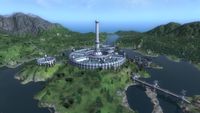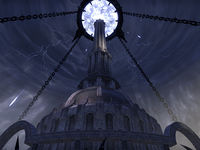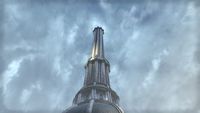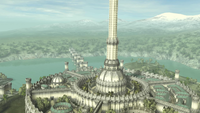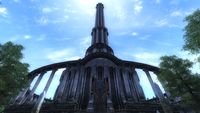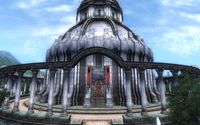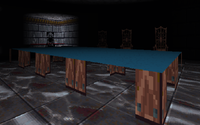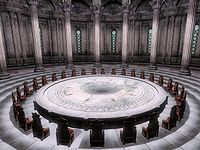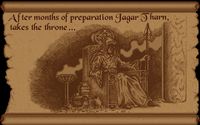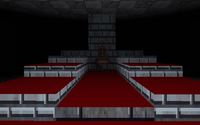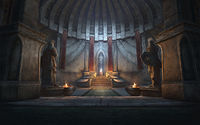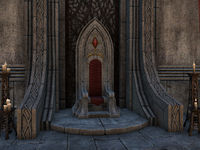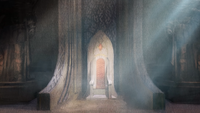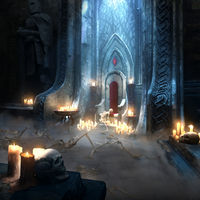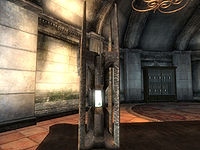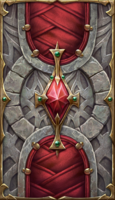Lore:White-Gold Tower
| White-Gold Tower | |
|---|---|
| Type | Tower |
| Continent | Tamriel |
| Province | Cyrodiil |
| Region | Heartlands (City Isle) |
| Settlement | Imperial City |
| Appears in | Arena, Oblivion, ESO |
The White-Gold Tower (sometimes White Gold Tower),[1] also called the Imperial Palace, White-Stone Tower or simply White-Gold,[2][3][4] is the enormous central spire of the Imperial City, located in the heart of the Palace District, Green Emperor Way.[5]
White-Gold was built in emulation of the Adamantine Tower,[6] the oldest known structure on Tamriel.[7] Like the other Towers of Nirn, some speculate that White-Gold Tower wields the power necessary to keep Mundus from dissolving back into Oblivion.[8]:123[UOL 1]
History[edit]
The tower was built by the earliest Aldmeri migrants to Cyrodiil in the middle Merethic Era and was the center of the region occupied by their descendants, the Ayleids.[9][10] The tower was originally called the Temple of the Ancestors[11] (known to the Nedes as the Citadel),[12] and was home to the Ten Ancestors, a set of Ayleid statues made from meteoric iron and glass.[11] The distance between the Ayleids' lands and those of their theoretical overlords led to the establishment of White-Gold Tower as an independent city-state in 1E 0;[9] a state that lasted until Alessia overthrew Ayleid rule in 243.[13][14] The Ten Ancestors were removed from the temple before its sacking and were dispersed among several Ayleid cities.[11]
In 1E 243, the Alessian Slave Rebellion came to a head, and the armies of man, led by Morihaus, attacked and took the White-Gold Tower.[12][15] According to the official histories of the Alessian Empire, when the tower was captured, all the Ayleids' relics of arcane power were taken and destroyed. However some insisted that an unknown Ayleid king escaped with the chief artifacts, which eventually found themselves a home in the Reliquary of Stars in Valenwood.[16][17]
Under the human-dominated Empires, it served as the Imperial Palace and as a defining symbol of those Empires. Some scholars even suggest the tower itself changed Cyrodiil from a subtropical jungle into a realm of temperate forests and fields in order to meet the needs and wishes of its new human masters.[18] The tower hosted the vaults and libraries of the Moth Priesthood. It can be seen from all over the Imperial City and the surrounding countryside. Underneath the tower and in the vast Imperial City Sewers is the Barathrum Centrata, the centralmost point of the sewer system and foundation of the White-Gold Tower.[19]
In 2E 582, the Ruby Throne was located on the ground floor.[20] By 3E 433, however, the ground floor was the location of the Elder Council chambers.[5]
Notes[edit]
- Tel Var Stones are believed to be pieces of the tower.
Gallery[edit]
-
Imperial Palace during the Simulacrum
(Arena) -
White-Gold Tower during the Planemeld
(ESO) -
White-Gold Tower after the failure of the Planemeld Obverse
(ESO) -
White-Gold Tower
(Oblivion) -
Jagar Tharn sitting on the Imperial Throne
(Arena)
See Also[edit]
- For game-specific information, see the Arena, Oblivion, and Elder Scrolls Online
 articles. Also see the Oblivion Imperial Palace article.
articles. Also see the Oblivion Imperial Palace article.
Books[edit]
- Subtropical Cyrodiil: A Speculation by Lady Cinnabar of Taneth — Thoughts on the climate of Cyrodiil and its relationship to the White-Gold Tower
References[edit]
- ^ Cherim's Heart of Anequina — Livillus Perus, Professor at the Imperial University
- ^ Aurbic Enigma 4: The Elden Tree — Beredalmo the Signifier
- ^ Guide to the Imperial City — Alessia Ottus
- ^ Red Eagle's Song — Varana Tappo, Imperial Scribe serving the Longhouse Emperors
- ^ a b The Imperial Palace in Oblivion
- ^ Beacon of Tower Zero furnishing name, appearance and Codex entries in ESO
- ^ Pocket Guide to the Empire, 1st Edition: High Rock — Imperial Geographical Society, 2E 864
- ^ The Infernal City — Greg Keyes
- ^ a b Before the Ages of Man — Aicantar of Shimerene
- ^ Pocket Guide to the Empire, 1st Edition: Cyrodiil — Imperial Geographical Society, 2E 864
- ^ a b c Umbacano's dialogue in Oblivion
- ^ a b Varieties of Faith... — Brother Mikhael Karkuxor of the Imperial College
- ^ The Last King of the Ayleids — Herminia Cinna
- ^ Shezarr and the Divines — Faustillus Junius
- ^ Pocket Guide to the Empire, 3rd Edition: All the Eras of Man, A Comprehensive History of our History — Imperial Geographical Society, 3E 432
- ^ Reliquary of Stars loading screen in ESO
- ^ Remnants of Cyrod
- ^ Subtropical Cyrodiil: A Speculation — Lady Cinnabar of Taneth
- ^ Imperial Architect's Correspondence — Mycaelis Julus
- ^ White-Gold Tower in ESO
Note: The following references are considered to be unofficial sources. They are included to round off this article and may not be authoritative or conclusive.
- ^ Nu-Mantia Intercept — Nu-Hatta
